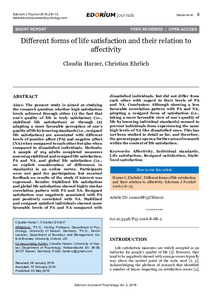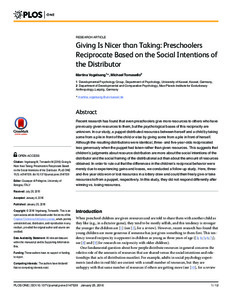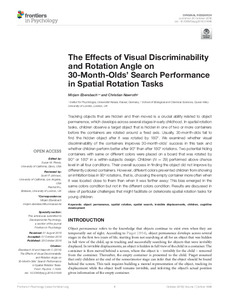Suche
Anzeige der Dokumente 1-3 von 3
Aufsatz
 Different forms of life satisfaction and their relation to affectivity
Different forms of life satisfaction and their relation to affectivity
(2016-05-03)
Aims: The present study is aimed at studying the research question whether high satisfaction levels achieved through either (1) the fact that one's quality of life is truly satisfactory (i.e., stabilized life satisfaction) or through (2) adapting a more favorable perception of one's quality of life by lowering standards (i.e., resigned life satisfaction) are associated with different levels of positive affect (PA) and negative affect (NA) when compared to each other but also when compared to dissatisfied individuals.
Case ...
Aufsatz
 Giving Is Nicer than Taking: Preschoolers Reciprocate Based on the Social Intentions of the Distributor
Giving Is Nicer than Taking: Preschoolers Reciprocate Based on the Social Intentions of the Distributor
(2016-01-25)
Recent research has found that even preschoolers give more resources to others who have previously given resources to them, but the psychological bases of this reciprocity are unknown. In our study, a puppet distributed resources between herself and a child by taking some from a pile in front of the child or else by giving some from a pile in front of herself. Although the resulting distributions were identical, three- and five-year-olds reciprocated less generously when the puppet had taken rather than given resources. ...
Aufsatz
 The Effects of Visual Discriminability and Rotation Angle on 30-Month-Olds’ Search Performance in Spatial Rotation Tasks
The Effects of Visual Discriminability and Rotation Angle on 30-Month-Olds’ Search Performance in Spatial Rotation Tasks
(Frontiers Research Foundation, 2016-10-20)
Tracking objects that are hidden and then moved is a crucial ability related to object permanence, which develops across several stages in early childhood. In spatial rotation tasks, children observe a target object that is hidden in one of two or more containers before the containers are rotated around a fixed axis. Usually, 30-month-olds fail to find the hidden object after it was rotated by 180°. We examined whether visual discriminability of the containers improves 30-month-olds’ success in this task and whether ...



